Mephisto * * ** *
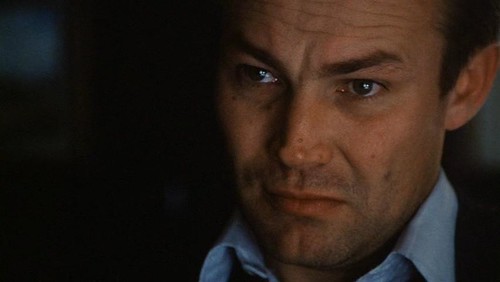
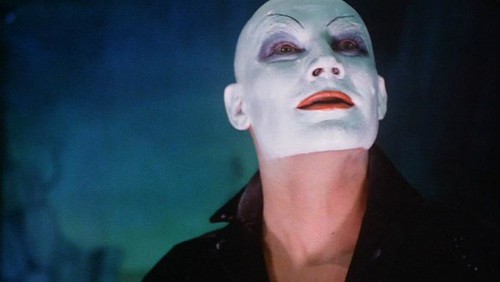
Mephisto ranks as one of my favorite films of all time. Brandauer's performance is nothing short of amazing. This isn't just my impression; you won't see a review of Mephisto anywhere that does not comment about his performance. This film also explores a topic that is fascinating to me -- the compromises an artist is willing to make to fulfill their personal goals. In this case, Brandauer plays a German actor who chooses to stay in Germany after the Nazis gain power, and he slowly makes more and compromises, until he is essentially a puppet.
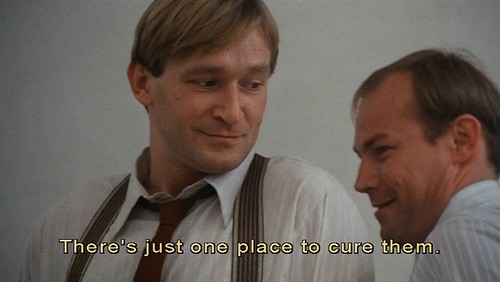
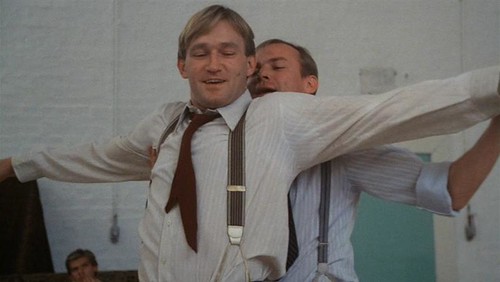
Mephisto is the first film in the trilogy (Mephisto, Colonel Redl, Hanussen) by the Hungarian director, Istvan Szabo. This trilogy is a series of character studies exploring the compromises that individuals, in particular talented and ambitious individuals, make to work within a totalitarian system and explores the effects of these compromises on the individual as a person. It explores the responsibility and culpability of the both the artist and their art.
“...because I know the world of theatre, and because I love actors, I look at them. They can communicate with the audience, reach out to, challenge or seduce the people watching. So they represent all the talented people in life. They help me, through their stories, to tell the problems of talented people.” –- Istvan Svadbo.
In Mephisto, Szabo explores this conflict using the fictional story of Hendrik Hoefgen, a talented and ambitious actor/director, who decides to stay and continue to work in Germany after the Nazis come to power. The story follows Hendrik from his early days in Hamburg as a provincial actor/director caught up in the excitement of changing the theater as a socialist experience. He is possessed of grand dreams, a palpable vanity, and unrelenting ambition. Yet he is strikingly human in his vulnerability, and Maria-Brandauer perfectly brings to the screen this mix of vulnerability combined with a sense of ‘grand destiny’, and pulls of difficult, intimate monologues that make one’s stomach lurch.
As the Nazis gain political power, Hendrik’s social circle is increasingly focused on the political changes and people close to him are struggling with the decision to stay or go. Hendrik is concerned only with art. He chooses to believe that his professional life is not a political statement: “What is politics to me? I’m an artist, an artist. I don’t care about politics.” When the Nazis eventually win in the elections, Hendrik chooses to stay (well, more specifically he returns to Germany since he happened to be out of the country at the time). Whatever he might have told himself about the artist being apolitical, a totalitarian government holds no such illusions. The story follows how he is seduced and manipulated by the Nazis and his concomitant moral corruption until he is little more than a Nazi puppet. And yet, it is a sympathetic – while still unforgiving --character study.
“Vanity is the artist's weakness; it enables seduction. Those are the problems, but they did nothing wrong. The problem is that if you once decide to be a prostitute, then you cannot start to cry if you have to make love for money.” – Istvan Svadbo.
The dilemma faced by the artist within a totalitarian government is a dilemma that is personal to Szabo. Born in 1936, he would have experienced during his formative early 20s, the most brutal of the communist period – the 1950s – during which dissent was severely punished and creative output constrained in the soviet realism style. In the 1956, there was the Hungarian Uprising, a populist revolt against the Communist government. This revolt was brutally and bloodily crushed by the Russian Army – afterwards many people were jailed or executed and a strict totalitarianism was imposed for another 30 years. Szabo was 20 years old in 1956.
“I am a child of the 2nd world war and when I went to the school, we had the Stalin era, which was really very hard and terrible. And then we had the revolution in 1956, so I had not an hour in my life that was not influenced by historical and political events. And I know nobody from my family or even from my neighborhood, they were not influenced by terrible political tragedies. Lost people, lost families, emigrated people everywhere around myself.” --Istvan Svadbo [from the Naked Face interviews on the DVD]
Although Mephisto is set in Nazi Germany, the themes in the film are part of the common experience of Central Europe in the 20th century and of Svadbo’s personal experience – the revolutionary period, then a nationalistic period, followed by ideological totalitarianism. Szabo is exploring transformations he surely saw in friends and perhaps feared in himself. Szabo does not give any easy answers or opinions on this. But he grapples with an issue that we can’t avoid:
"To be accepted by a political regime and accept it, or not. How to live in a country that has an ideology, a state ideology, which is terrible. What is the role of the artist, what is the role of art. How to manage it. And what to do with the real values? Can you leave them and run away? Or is it your duty to save them. So there are enormous questions. The major question is if an artist is guilty because he is corrupted by a political regime, is his art also guilty?" -- Istvan Svadbo
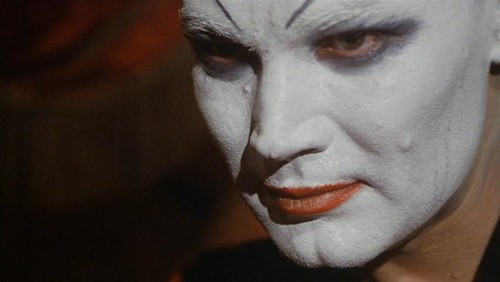
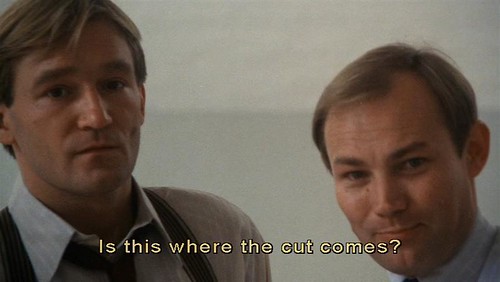
Buy it at Amazon
Rent from Netflix
Labels: Cserhalmi, Germany, Maria-Brandauer, pre-WWII, Szabo

<< Home